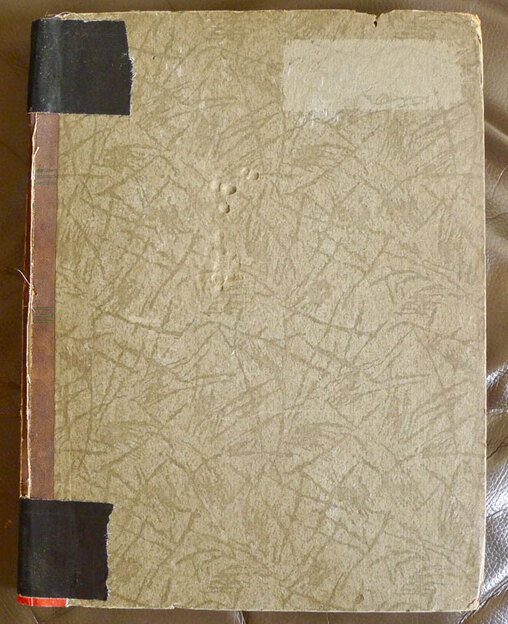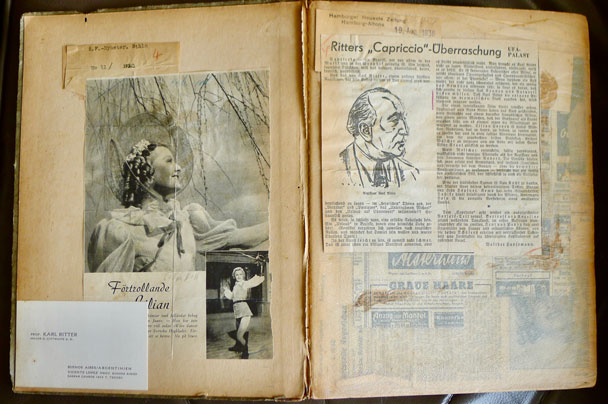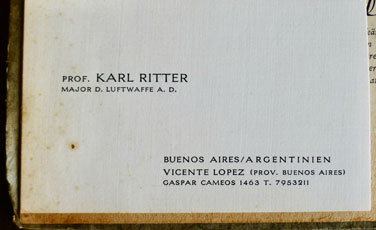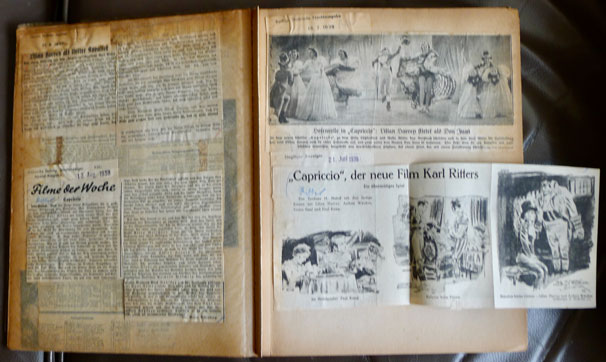- Home
- POSTER GALLERY
- ❗️BOOK & POSTER STORE❗️
- About the Posters
- The William Gillespie Collection
- Our Publishing House
- ❗️GFDN interviews author and collector William Gillespie ❗️
- Our most expensive & inexpensive finds!
- ❗️***NEW!*** Poster of the Month ❗️
- ❗️NEW ❗️Film Posters – Demands on an important means of film advertising. ❗️
- In our Book + Zeitschrift Library
- ❗️ ***NEW!*** Hitler Youth Quex – A Guide for the English–speaking Reader ***NEW!*** ❗️
- ❗️***NEW!*** Table of Contents of our new HJ QUEX book❗️
- ❗️Hitler Youth Quex Guide - early praise! ❗️
- Recent loans from the Collection
- Farewell Horst Claus. (1940–2024)
- "Der Deutsche Film" Zeitschrift
- ❗️ ***NEW!***German "Tendency" Films (Tendenzfilme) in the Third Reich ❗️
- KARL RITTER
- Karl Ritter original film posers in this Collection
- "Besatzung Dora" ( † 1943)
- "The Making of The Crew of the Dora"
- Karl Ritter at the 1938 Reichsfilmkammer Congress
- INDEX -"Karl Ritter" book, 2nd edition
- Karl Ritter's Legion Condor (1939, unfinished)
- Excerpt from our "Dora" book
- ∆∆∆∆∆ High praise for our DORA book! ∆∆∆∆∆
- TABLE OF CONTENTS – "Legion Condor"
- § § § § § Early Praise for our LEGION CONDOR book! § § § § §
- ❗️"Das Leben geht weiter" and Karl Ritter ❗️
- Zarah Leander Europe–wide !
- Japan Military Film and Karl Ritter
- Karl Ritter after 1945
- 1935 Film Congress
- Poster Exhibition in Berlin, March 1939
- Potsdam poster exhibition 12 April–25 August 2019
- Leni Riefenstahl's two "Olympia" Films (1938)
- "Ohm Krüger" (1941)
- Emil Jannings
- "Blutendes Deutschland" (1933)
- Hannes Stelzer ( † 1944)
- Klaus Detlef Sierck ( † 1944)
- Film stills
- Reich Film Censorship Offices
- ❗️Dateline: Ufa - April 11, 1945 ❗️
- ❗️***NEW!***The Fate of the German Film Industry in May 1945 ❗️
- Film censorship cards
- Film Archives
- Cinema advertising
- School filmstrips
- ❗️UPDATED❗️ Z F O / Ostland Film G-m-b-H
- Z F O / Herbert Jacobi estate
- ZFO / Ostland Film newspaper articles
- ❗️***NEW!*** Roter Nebel / Red Fog / Red Mist (1942/1943, ZFO) ❗️
- ZFO - Der Rückkehrer - The Returnee (1943/1944)
- The D F G production company
- D I F U
- ❗️ ***NEW!*** "Carl Peters" – Special Collection. ❗️
- "Alcazar" (1940, Genina)
- "Der 5. Juni" (1943, banned)
- ❗️ ***NEW!*** Herbert Selpin and his "Titanic" (1943) ❗️
- ❗️ ***NEW!*** Ein Robinson (1940, Fanck) ❗️
- "Fronttheater" (1942)
- Veit Harlan's Jud Süß and Fritz Hippler's Der Ewige Jude
- Harlan "Jud Süß" trial 1949
- Werner Krauss & JUD SÜß
- Anti-Semitic Film Posters in the Collection
- "Heimkehr" (1941)
- "Hitlerjunge Quex" (1933)
- ❗️***NEW!*** Hitlerjunge Quex in 111 Greater Berlin Cinemas ❗️
- Jürgen Ohlsen
- "S.A.Mann Brand" (1933)
- "In der roten Hölle" (Edgar Neville, 1939)
- "Helden in Spanien" (1938)
- The Spanish Civil War in Film
- Andrews Engelmann (1901 – 1992)
- Deutsche Wochenschau
- Uƒa Feldpost
- Uƒa Kulturfilm – Informationen
- " Die Tochter des Samurai" (1937, Fanck)
- Ufa 25th Anniversary
- Invitations to world premieres
- ❗️***NEW!*** Continental Films, Paris 1940–1944 ❗️
- Film Censorship in Occupied Paris 1942
- "Der Sieg des Glaubens" (1933)
- Wilhelm Althaus Estate
- Weimar Germany posters
- Ufa and the Ordensburgen
- The Gaufilmstelle in our Collection
- "Zwei Welten" (1940)
- "Capriccio" (1938) –Karl Ritter film album
- Unrealised NS Propaganda Films 1934–1945
- German Film Directors accused of "war crimes"
- Australian––themed NS feature films
- "Der Störenfried" / "The Troublemaker"
- What was new in 2014?
- What was new in 2015?
- What was new in 2016?
- What was new in 2017?
- What was new in 2018?
- What was new in 2019?
- What was new in 2020?
- What was new in 2021?
- What was new in 2022?
- What was new in 2023 ?
- What's new in 2024?
- ❗️***NEW!*** Hitler assassination attempt in Karl Ritter film cut❗️
- BESATZUNG DORA private photos
- Just discovered 1942 article on BESATZUNG DORA
- The Karl Ritter Tetralogy
- Google Analytics 2023
- Our first–ever acquisition!
- ❤️"Some of our favourite things....!"❤️
- ERRATUM for our " Hitler Youth Quex Guide"
- Trending
- Vale †
- Our Wants List / 2024 / Wunschliste
- Pop Quiz
- Unsere KARL RITTER Bücher in Deutschland liefbar!
- WHERE to buy our books right now?
- ✉️Contact
 “History is not about the facts. It is about the context and who is telling the story.” —Prof. Milton Fine.
“History is not about the facts. It is about the context and who is telling the story.” —Prof. Milton Fine.
"Who controls the past controls the future: who controls the present controls the past." –– George Orwell in his novel "1984."
"Whoever doubts the exclusive guilt of Germany for the Second World War destroys the foundation of post–war politics." –– Prof. Theodor Eschenberg, Rector, the University of Tübingen.
"If we have our own why in life, we shall get along with almost any how." – Friedrich Nietzsche
POSTER GALLERY --view
over 500 German film
original posters between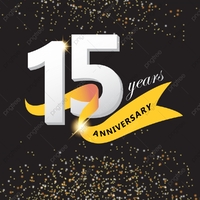
1927–1954 from
Germany and from
many Axis and Neutral countries
across Europe!
Note! Posters in the Poster Gallery are PERMANENT
acquisitions which are NOT FOR SALE!! ONLY the
posters listed in our POSTER STORE are for sale.
(They have a price and order button to use.)
Karl Ritter's personal clippings album for
Capriccio (D; 1938)
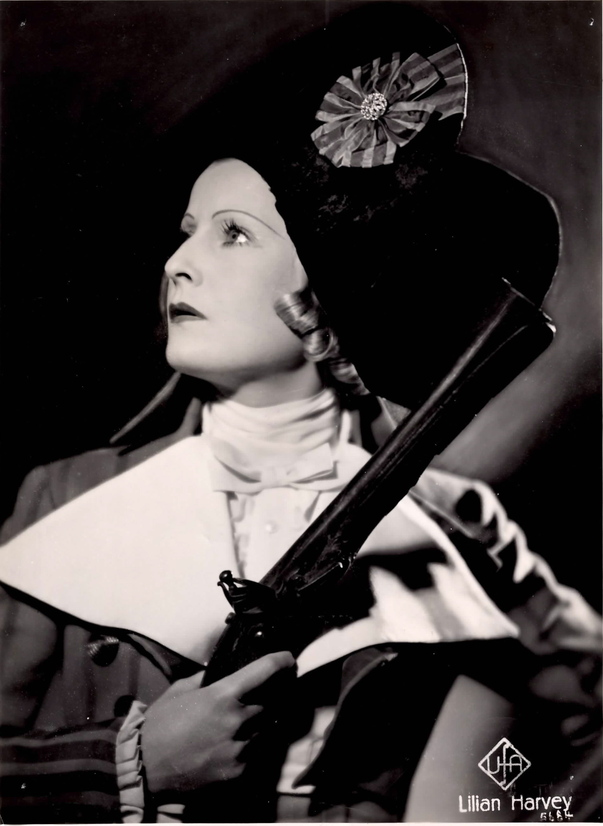
During the filming of the comedy Capriccio, starring Lillian Harvey, Ritter had his first dispute with Dr. Joseph Goebbels. (see Goebbels’ diary entries for 1938, Chapter 9). The film was assigned to Ritter by Ufa in August ’37 based on an idea proposed by Harvey to the film studio in 1935. By the time filming was to commence, Harvey had fallen foul of Goebbels due to her intervention on behalf of persecuted individuals and her reported anti–NS comments.
After filming began, Ritter was summoned to the Propaganda Ministry on 13 January ’38 and spent an hour convincing Goebbels that the film was now too far advanced to be cancelled. Ritter’s diary entry stated:
I have to go to Goebbels. At one o’clock! In the midst of preparations, he wants to stop. Is against the film material. I fall almost to my knees in front of him; entreat him, that it was not possible to make a state political film with Lillian Harvey. I at least knew how not to tell him how far we are with expenses etc. I must have spoken with the tongues of angels because after an hour he picked up the order of discontinuance. But he warned me! Urgently! I left his study with trembling knees.
On May 5th Ritter was summoned again to the Propaganda Ministry, where Goebbels’ State Secretary Hanke confronted him. Ritter’s diary reads:
Hanke appeared with other gentlemen....a terrible bit followed…Hanke had some scenes from Capriccio shown. Then broke off and read a scathing letter from his minister, Goebbels...Main thrust: the films in the Third Reich should not look like that! He wished to see no more such -etc.
Excerpt from:
Karl Ritter – His Life and ‘Zeitfilms’ under National Socialism, pp.24–25 Available to purchase in our Book & Poster Store.
On August 16, 2010 we won at auction the personal newspaper article and film review clippings Capriccio album of director Karl Ritter. This was at a time when we were still researching and about to compose the first edition of the Karl Ritter biography. We paid US$100 plus postage to the seller in Argentina. We also bought afterwards his only other Ritter items, a few snapshots of the young future Director as a soldier in WWI.
We presume that Karl Ritter kept a clippings album for all his films. We have never seen another such album either in archives or museums. In July 2014 Aisthesis Verlag, Bielefeld published the book THE PLACE OF POLITICS IN GERMAN FILM, with a chapter on Karl Ritter's Capriccio (1938) using information from the Collection, drawing on the personal film clipping Capriccio album of Karl Ritter and other materials. (Chapter 4, by Valerie Weinstein, "Third Reich Film Comedy as a Place of Politics: Masculinity, Marriage, and Mayhem in Karl Ritter's Capriccio," pp. 85–104).
BELOW we show some images form the album, including Ritter's business card at the time he and his family migrated to Argentina after WWII. The album has forty full album pages crammed with newspaper articles on the film, and film reviews from all over the Reich, from other European capital cities, from Tokyo, Buenos Aires, and elsewhere.
